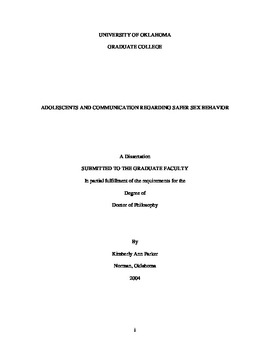| dc.contributor.advisor | Pfau, Michael W., | en_US |
| dc.contributor.author | Parker, Kimberly Ann. | en_US |
| dc.date.accessioned | 2013-08-16T12:19:29Z | |
| dc.date.available | 2013-08-16T12:19:29Z | |
| dc.date.issued | 2004 | en_US |
| dc.identifier.uri | https://hdl.handle.net/11244/766 | |
| dc.description.abstract | As adolescent pregnancy, childbearing and STD transmission has continued to be a pervasive problem in American society, it has become more and more critical to understand the nuances of teen sexual behavior. Policy makers, parents, teachers, and community advocates are actively searching and advocating for interventions that will assist young people in reducing the risk associated with sexual involvement. Understanding the antecedents that predict adolescent sexual behavior has become an important part of developing interventions aimed at reducing risky sexual behavior among adolescents. Thus, this research focused on understanding the antecedents that predict adolescents' communication behaviors regarding sexual activity and contraceptive use. | en_US |
| dc.description.abstract | Overall, the results of this research did not find strong support for a relationship between identity, self esteem, attachment and adolescent communicative behavior regarding sex and contraception. However, this study adds to the research in interpersonal communication and adolescent development by probing what theoretical perspectives may offer a framework for understanding adolescent communication related to sex and contraception. This study illustrates that adolescents' identity status does increase one's communication efficacy, but the results did not confirm the relationship between identity status and sex and contraceptive discussions. It remains to be seen whether identity status differences influence adolescents' communication about their sexual behavior. While this study did not confirm many of the assertions of this research, it does provide a foundation for future research aimed at increasing our understanding of adolescent communication regarding sex and contraception. | en_US |
| dc.description.abstract | This study focused on 18- and 19-year old adolescent males and females. The research sought to advance our understanding of the theoretical frameworks that may predict or be associated with adolescent sexual and contraceptive communicative behavior. Identity, self esteem and attachment theories were used to investigate these antecedents' influence on adolescent sexual and contraceptive communication. In particular, how these theoretical perspectives affect adolescents' communication self efficacy, comfort discussing sex and contraception and perceived communication self efficacy regarding sex and contraception. | en_US |
| dc.format.extent | xiii, 83 leaves ; | en_US |
| dc.subject | Communication in sex. | en_US |
| dc.subject | Young adults Oklahoma Sexual behavior. | en_US |
| dc.subject | Health Sciences, Public Health. | en_US |
| dc.subject | Speech Communication. | en_US |
| dc.title | Adolescents and communication regarding safer sex behavior. | en_US |
| dc.type | Thesis | en_US |
| dc.thesis.degree | Ph.D. | en_US |
| dc.thesis.degreeDiscipline | Department of Communication | en_US |
| dc.note | Adviser: Michael W. Pfau. | en_US |
| dc.note | Source: Dissertation Abstracts International, Volume: 65-07, Section: A, page: 2431. | en_US |
| ou.identifier | (UMI)AAI3138528 | en_US |
| ou.group | College of Arts and Sciences::Department of Communication | |
